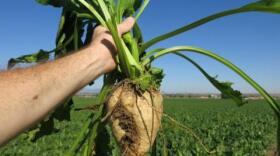There'sa heated debate happening right now about GMOs and labels. Big food companies such as General Mills, Mars, and Kellogg's say they plan to put labels on their products that tell consumers whether the food contains ingredients derived from genetically engineered plants.
So what’s the big deal? What are GMO labels, and what do they tell you?
Watch the video below to get the full scoop on GMO labels. But here are three things you should know:
1. Think processed food
GMO stands for Genetically Modified Organisms. GMO labels would be slapped on food that contains ingredients made from plants that were genetically engineered.
Many processed foods contain corn syrup,soybean, canola or cottonseed oil.Most of those crops grown in the U.S. are genetically engineered. Scientists can insert a gene into a variety of corn, for instance, to make it immune to a weedkiller, so when farmers spray their fields the weeds die but the corn doesn’t.
2. Don’t think safety or nutrition
Some food and consumer groups say products made from GMO cropsshould have special labels for the sake of transparency.
Food regulators here in the U.S. don’t require them, though, and the U.S. Food and Drug Administration saysGE ingredients are just as nutritious and safe to eat as ingredients from other crops. GMO labels won’t verify safety or nutrition.
Other advocates object to the cultivation of the current slate of GE crops forenvironmental, economic and political concerns.
3. Think Vermont
Vermont passed a lawrequiring GMO labels on food sold in the state. And there’s a deadline: the labels must be in effect by July 1.
In response, some companies are going ahead with the labels, saying they can’t afford different labels for different states. Other companies are fighting the law – they worry the labels will look like a warning and scare consumers.
Of course, if you want to go GMO-free you can buy foodlabeled by the Non-GMO Project, a nonprofit organization, or you can buy organic. Food that sports a USDA organic seal is not allowed to contain ingredients derived from GE plants.










